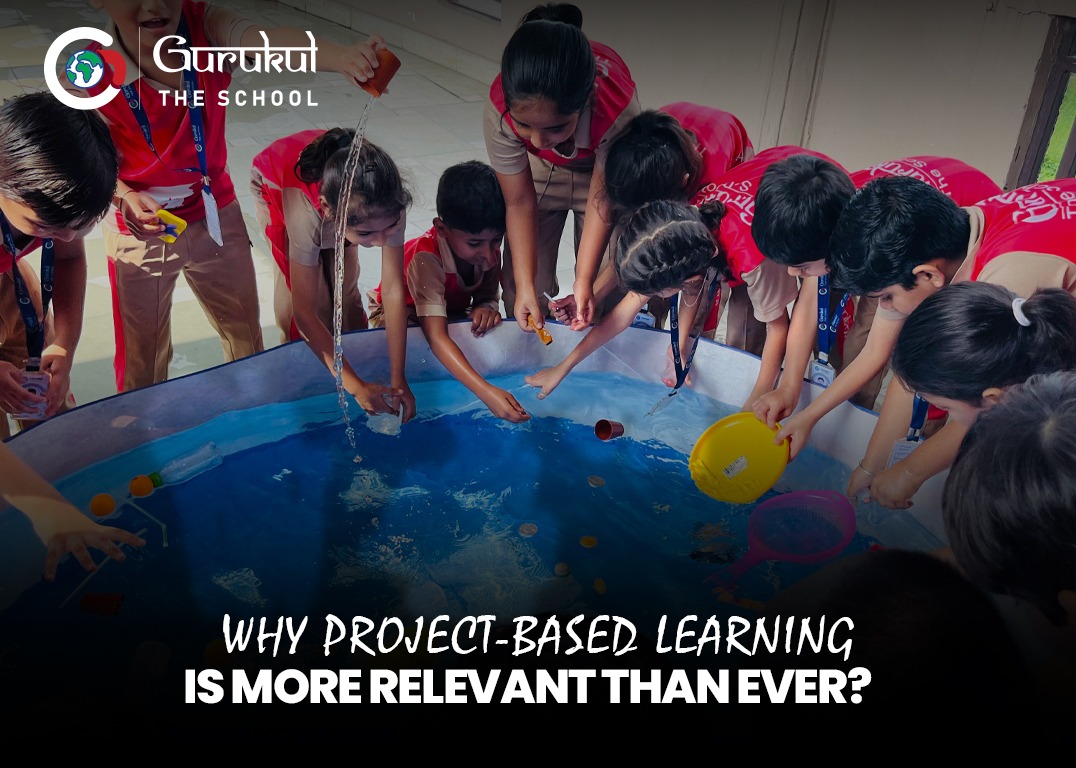Why Project-Based Learning is More Relevant Than Ever?
posted on May 06, 2025
Gurukul The School would like to specifically mention, especially from our experience, that project-based learning is not limited to scoring a certain score in the examinations

The field of education has undergone a tremendous transformation in the last few years, and it has definitely been for the better. In the initial days, traditional learning methodologies focussed only on the receipt of information with very little emphasis on whether the student is actually learning the application of acquired knowledge or not.
That’s where project-based learning steps in as a part of new-age education. Project-based learning helps ensure practical exposure to an extent wherein students learn how to put their knowledge to actual use to solve real-world problems. We at Gurukul The School, one of the Best school in Ghaziabad, are all for being inclusive of project-based learning and have been applying the same at all levels. In this blog post, we will explain why project-based learning is a real winner when it comes to knowledge impartation in the true sense of the term.
-
Backed by NEP 2020 Provisions:
If you have had the chance to go through the NEP 2020 provisions, you will know the kind of emphasis it lays on project-based learning. These provisions underline the importance of creativity, critical thinking, and continuous learning for the growth and progress of children, something that the NEP 2020 guidelines suggest project-based learning can make possible.
NEP 2020 tells us how project-based learning equips children with real-world functionalities, be it leadership, problem-solving, and communication, while ensuring the curriculum is well understood. This is enough reason for educational institutes to give project-based learning a 10/10 while working on adopting the same.
-
A deeper understanding of concepts:
Irrespective of the class a child is studying in, multiple subjects need attention. Amidst this, it is common for children to fail to understand the depth of each of these subjects and individual concepts alike.
This is where project-based learning comes to the rescue by encouraging research, exploration, and experimentation. Moreover, for successful completion of the project, children have no option but a pressing need to refer to additional resources. In the process, they end up mastering the subject in question and continue to groom their skills further in the upcoming years.
We at Gurukul The School believe that every child is uniquely blessed and has something meaningful to bring to the table. This means if a child sits down to learn history, he/she might learn three concepts, but with peers by their side, they might just end up learning six concepts as a result of the contribution on the part of these other students. This is the core of project-based learning, which, in the end, is all for fostering collaboration.
In the process, children learn the power of teamwork, the need to respect other’s perspectives, and how challenges become easier when solved in groups, something that comes in handy in their grown-up/professional days.
-
Increased Learning Commitment:
If there is one thing most parents are seemingly stressed about today, it has to do with a lack of commitment and involvement from children during their learning hours. Well, we believe it is not worth putting the blame on students, as on most occasions, this is a result of monologues on the part of tutors, which has been a part of traditional classroom learning for years. The scenario has, however, changed now.
Project-based learning ends the monotony associated with information delivery in classrooms, ensuring that children feel pumped, curious, and enthusiastic to learn. At Gurukul The School, we do this by getting children involved in the process of learning from start to end, by handing them the necessary responsibility and accountability to act and perform, and, most importantly, by giving them a wider timeframe to do their best on the project. This approach forwards the idea of self-learning and makes students self-reliant.
-
Empowerment from Life Skills:
There was a time when it was enough for children to score a certain grade in school. A good grade was then seen as a sign that the child was learning well. However, today’s education system demands that children not just pass examinations with flying colours but also possess the necessary life skills, right from leadership, communication, and problem-solving to decision-making and time management, to excel in their respective lives.
This is, again, something project-based learning makes possible by encouraging lifelong learning, a process that ensures that the students imbibe all the important life skills from time to time.
Conclusion:
If holistic development of your children is what you wish to achieve, then project-based learning is what you must not look away from. Project-based learning comes with its own set of benefits, which makes sure that children continue to learn everything that is relevant today, not something that has been printed in schoolbooks years ago.
Here, we at Gurukul The School would like to specifically mention, especially from our experience, that project-based learning is not limited to scoring a certain score in the examinations. Instead, it is all for helping students to do something meaningful with their lives and build them from the ground up professionally. As one of the top CBSE schools in Ghaziabad, we stand by this form of learning for the greater good of the students.